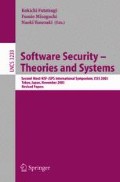Abstract
We present an explicit treatment of assumptions on a principal’s honesty in compositional logic. Our central idea is to divide an honest principal’s role into its components, and these components are composed during the proving steps of a property useful to prove a protocol correctness. We distinguish the monotonic properties and the non-monotonic ones.
Access this chapter
Tax calculation will be finalised at checkout
Purchases are for personal use only
Preview
Unable to display preview. Download preview PDF.
References
Burrows, M., Abadi, M., Needham, R.: A Logic of Authentication. Technical Report 39, Digital System Research Center (1989)
Cervesato, I., Durgin, N.A., Lincoln, P.D., Mitchell, J.C., Scedrov, A.: A meta-notation for protocol analysis. In: 12th IEEE Computer Security Foundations Workshop (1999)
Cervesato, I., Durgin, N.A., Lincoln, P.D., Mitchell, J.C., Scedrov, A.: A Comparison between Strand Spaces and Multiset Rewriting for Security Protocol Analysis. In: Okada, M., Pierce, B.C., Scedrov, A., Tokuda, H., Yonezawa, A. (eds.) ISSS 2002. LNCS, vol. 2609, pp. 356–382. Springer, Heidelberg (2003)
Cervesato, I., Durgin, N.A., Lincoln, P.D., Mitchell, J.C., Scedrov, A.: Multiset rewriting and the complexity of bounded security protocols. Journal of Computer Security 12(1), 677–722 (2004)
Clark, J., Jacob, J.: A Survey of Authentication Protocol Literature: Version 1.0 (web draft) (1997)
Datta, A., Derek, A., Mitchell, J.C., Pavlovic, D.: A Derivation System for Security Protocols and its Logical Formalization. Journal of Computer Security, Special Issue of Selected Papers from CSFW-16 (2004)
Datta, A., Derek, A., Mitchell, J.C., Pavlovic, D.: Secure Protocol Composition. In: Proceedings of 19th Annual Conference on Mathematical Foundations of Programming Semantics. ENTCS, vol. 83 (2004)
Diffie, W., Hellman, M.E.: New directions in cryptography. IEEE Transactions on Information Theory IT-22(6), 644–654 (1976)
Diffie, W., van Oorschot, P.C., Wiener, M.J.: Authentication and authenticated key exchange. Designs, Codes and Cryptography 2, 107–125 (1992)
Durgin, N.A., Lincoln, P.D., Mitchell, J.C., Scedrov, A.: Undecidability of bounded security protocol. In: The 1999 Federated Logic Conference (FLoC 1999), pages 11 (1999)
Durgin, N., Mitchell, J., Pavlovic, D.: A compositional logic for proving security properties of protocols. Journal of Computer Security 11(4), 677–721 (2003)
Fábrega, F.J.T., Herzog, J.C., Guttman, J.D.: Strand spaces: Why is a security protocol correct? In: Proceedings of the 1998 IEEE Symposium on Security and Privacy, pp. 160–171 (1998)
Guttman, J.D., Fábrega, F.J.T.: Authentication tests and the structure of bundles. Theoretical Computer Science 283(2), 333–380 (2002)
Hasebe, K., Okada, M.: A Logical Verification Method for Security Protocols Based on Linear Logic and BAN Logic. In: Okada, M., Pierce, B.C., Scedrov, A., Tokuda, H., Yonezawa, A. (eds.) ISSS 2002. LNCS, vol. 2609, pp. 417–440. Springer, Heidelberg (2003)
Hasebe, K., Okada, M.: Non-monotonic Properties for Proving Correctness in a Framework of Compositional Logic. In: Proceedings of the workshop on Foundations of Computer Security 2004 (LICS and ICALP affiliated workshop), Turku, Finland, pages 12 (2004) (to appear)
IEEE. Entity Authentication Mechanisms - part 3: Entity Authentication Using Asymmetric Techniques. Technical report ISO/IEC IS 9798-3, ISO/IEC (1993)
Menezes, A.J., van Oorschot, P.C., Vanstone, S.A.: Handbook of Applied Cryptography. CRS press (1996) (fifth printing, 2001)
Syverson, P., Cervesato, I.: The Logic of Authentication Protocols. In: Focardi, R., Gorrieri, R. (eds.) FOSAD 2000. LNCS, vol. 2171, pp. 63–136. Springer, Heidelberg (2001)
Woo, T.Y.C., Lam, S.S.: Verifying authentication protocols: Methodology and example. In: Proceedings of the International Conference on Network Protocols (1993)
Author information
Authors and Affiliations
Editor information
Editors and Affiliations
Rights and permissions
Copyright information
© 2004 Springer-Verlag Berlin Heidelberg
About this paper
Cite this paper
Hasebe, K., Okada, M. (2004). Inferences on Honesty in Compositional Logic for Protocol Analysis. In: Futatsugi, K., Mizoguchi, F., Yonezaki, N. (eds) Software Security - Theories and Systems. ISSS 2003. Lecture Notes in Computer Science, vol 3233. Springer, Berlin, Heidelberg. https://doi.org/10.1007/978-3-540-37621-7_4
Download citation
DOI: https://doi.org/10.1007/978-3-540-37621-7_4
Publisher Name: Springer, Berlin, Heidelberg
Print ISBN: 978-3-540-23635-1
Online ISBN: 978-3-540-37621-7
eBook Packages: Springer Book Archive

